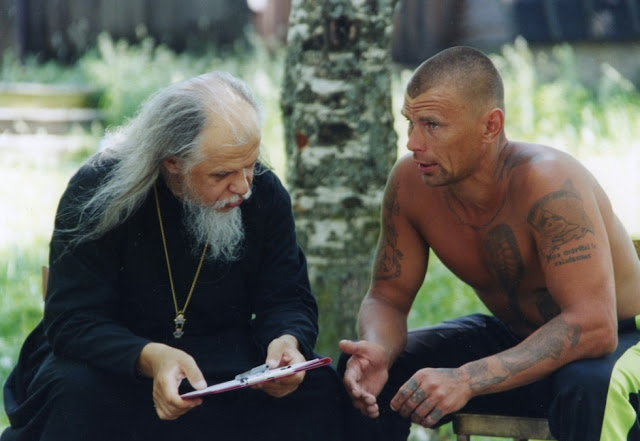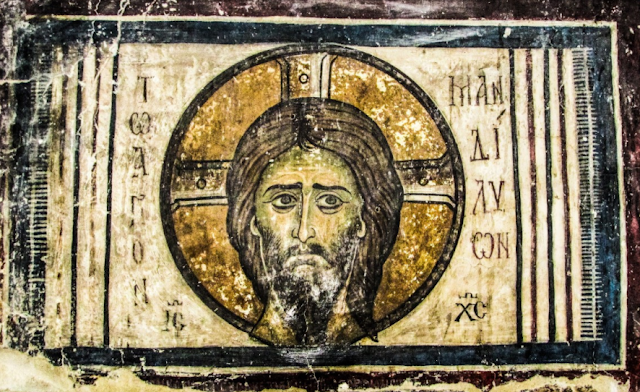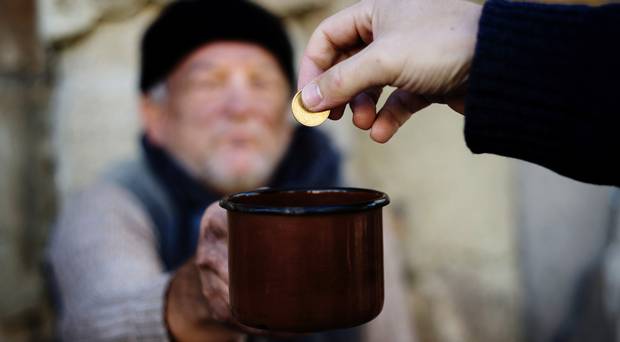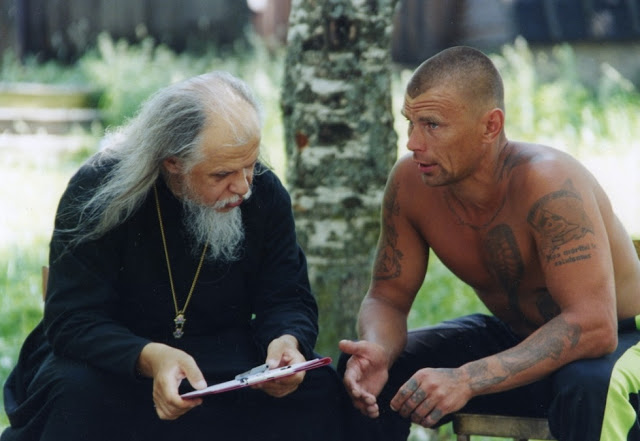
How would you respond to someone who destroyed or defaced a picture of one of your loved ones? You would probably be very upset with that person, for how we treat images of people indicates what we think of them. If we dishonor someone’s picture, we dishonor that person. But if we treat images with care and respect, we honor the person whose image it is.
On this Sunday of the Last Judgment, we remember that every human being is created in the image and likeness of God. There is no avoiding what that means: How we treat others is how we treat the Lord. Every person is a living icon, and how we treat them reveals the true nature of our relationship with Jesus Christ.
That is why He taught in today’s gospel reading that the ultimate standard of judgment is how we treat those whom it is so easy to disregard: the hungry, the stranger, the naked, the sick, and the prisoner. To the extent that we serve these people, we serve our Lord. To the extent that we ignore them, we neglect and denigrate Him. Christ says to the righteous, “In that you did it to the least of these my brethren, you did it to me.” And He says to those headed for punishment, “In that you did not do it to one of the least of these, you did not do it to me.”
We learn from this passage that the health or sickness of souls is manifested—is shown—in what we do every day as we encounter those whose life circumstances require sacrifice on our part for their well-being. Contrary to popular opinion, the Christian life is not some kind of pious escape from the unpleasant challenges of life, but a vocation to take up our crosses as we become living icons of our Lord’s love and mercy, especially for those whose challenges are in no way attractive or congenial to us.
It is hard to hear, but nonetheless true: How we treat the living icons of Christ manifests the true nature of our relationship with Him, regardless of what we say we believe. St. John wrote in his Epistle, “If someone says, ‘I love God,’ and hates his brother, he is a liar; for he who does not love his brother whom he has seen, how can he love God whom he has not seen?” (1 John 4:20) He also writes, “But whoever has this world’s goods, and sees his brother in need, and shuts up his heart from him, how does the love of God abide in him? My little children, let us not love in word or in tongue, but in deed and in truth.” (1 John 3: 17-18)
It is easy in a place such as Abilene, TX, to be a Christian in word only, for it usually costs us very little here to say that we believe in Jesus Christ. But that is only a matter of words which are rarely challenged in West Texas. It is much more demanding to be so united with Christ that we convey His love and mercy to everyone in our lives, especially those whose problems we would rather ignore. All the more is that the case when we notice that the righteous people in our gospel text were not even aware that they were caring for the Lord when they served those in need. They spontaneously showed love and mercy to their needy neighbors simply because that is the kind of people they were. That is how they served Christ without even knowing what they were doing.

If you are like me, you are a long way from meeting that standard of holiness. It is so easy to excuse ourselves from helping others because we have more important things to do. We say we are too busy and do not have enough resources. We think that other people’s problems are their fault and their concern, not ours. We like to avoid the truth that we really do encounter Christ in our neighbors, especially when they are annoying, demanding, and unappreciative.
Of course, we do not have to be wealthy or even healthy in order to give someone a call or otherwise express friendship. It does not require a lot of money to read to a child or to visit someone in a nursing home. A homebound person can send a note or email message or make a phone call. Even with Lenten fasting, many can donate blood and save someone’s life. Everyone can put at least something into the “Food for Hungry People” containers that we will distribute during Lent. No matter how young or old we are, we interact with people who need our companionship, our encouragement, and our prayers. Instead of ignoring them, we must treat them as Christ treats us, showing mercy and love even when we are more annoying, demanding, and unappreciative than we know.
It sounds so easy, but we all know how hard it is in practice. And that is precisely why we need the spiritual disciplines of Great Lent, such as fasting, prayer, almsgiving, forgiveness, and reconciliation. For when we humble ourselves before God and our neighbors in these ways, we open ourselves to the holy strength that conquers even death itself. When we turn our attention from obsessive self-centeredness to the love of God and neighbor, we take a crucial step toward the healing of our souls.
As much as we do not like to hear it, the person whose life circumstances we find to be revolting bears the image of God. Christ died and rose again for those whom we are inclined to condemn, disregard, and ignore. And, no, our lives will not be destroyed if our plans, schedules, routines, and agendas are put on hold or replaced by those a Kingdom not of this world. Since our goal is to enter that Kingdom, we should not be surprised when we experience discomfort and struggle in serving a Savior Whom the world rejected.

Even as St. Paul, in addressing whether Christians should eat meat that had been sacrifice to pagan idols, said that “if food makes by brother stumble, I will never again eat meat, lest I make my brother stumble,” we must undertake our Lenten disciplines so that we will find the spiritual strength not to cause others to stumble, especially by failing to show them the love and concern due to every living icon of the Lord. His ultimate judgment will be to confirm the state of our souls, to confirm who we have become through our thoughts, words, and deeds. Regardless of whether we have the eyes to see it, our daily actions shape us profoundly and have eternal consequences.
As we prepare for our Lenten journey, we should remember that fasting is not simply a change in diet, but a tool that can help us fight passions that keep us from serving Christ in our neighbors. When done in secret and with humility, fasting weakens the self-centeredness that keeps us from sharing God’s love with others. It is therapy for the healing of our souls that frees us to serve Christ in our neighbors more fully. Since they all bear the image and likeness of God, how we treat them is how we treat Him.

If you are like me, you really need the spiritual disciplines of Lent to help you serve Jesus Christ more faithfully. And if you wonder how to serve Him, just think about the sick, lonely, poor, and otherwise needy people you know. As St. James wrote in his epistle, “Pure and undefiled religion before God and the Father is this: to visit orphans and widows in their trouble, and to keep oneself unspotted from the world.” (James 1:27) Surely, that is the Lord’s will for us all this Lent and every day of our lives. If we live that way, then His judgment will confirm that we have shown others the same gracious mercy that we have received from Him. For since He has loved and served us so profoundly through His cross and glorious resurrection, then we must love and serve Him in all who bear His image and likeness. For even the most miserable and lowly human being is truly a living icon of Jesus Christ. Lent will help us gain the spiritual vision to see that glorious truth.




